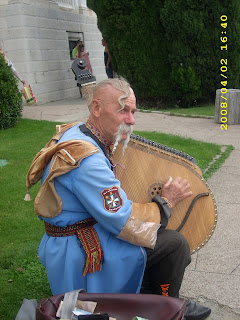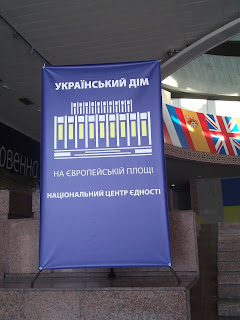Dr. Gulnara Bekirova was one of the speakers at the UJE conference in Kyiv. She is with the Special Kurultai Commission for the Research of Crimean Tatar Genocide, Ukraine. She spoke (in Russian btw, with no ill effects) during the session entitled The ‘Traitor Nation’and the Destruction of the Crimean Tatar Civilization.
The other was her friend who survived deportation to the Urals. Dr. Bekirova’s friend joined us in the lobby of the Swiss Hotel, where the UJE entourage was staying. Much of the conversation was private and personal ... including finding uncanny personal connections. (She even thought I looked familiar!) So much for the proverbial "six degrees of separation." For anyone with a Ukrainian connection anyway, it's usually two or three at most!
Earlier, I had a rare opportunity to chat with Dr. Bekirova over breakfast. There was a bit of a language barrier as she speaks “Surzhyk” (a mixture of Russian and Ukrainian) and I speak просто (kitchen) Ukrainian. I bitterly resent the language barrier, but appreciate learning what I did from that discussion, and the meeting with her friend later. Fortunately our intrepid leader, Raya, joined us at breakfast and kindly translated when I got stuck.
Dr. Bekirova told us that life in Crimea is dangerous now—for everyone, but especially for ethnic Ukrainians and Crimean Tatars. She lives in Simferopol, Crimea and publishes children’s books in the Crimean Tatar language, so that the language and culture survive. So far she has managed to stay out of the cross hairs of the occupying Russians.
When the occupation began and the Ukrainian army was still in Crimea, the Tatars brought the soldiers food and other supplies, and begged them not to leave Crimea, but to stay and protect them. As we know, the Ukrainian forces were overpowered by the Russian army and Putin’s green men, which are now occupying the peninsula.
But, Dr. Bekirova said: “We didn’t bow down to the Russians, and we never will. Crimean Tatars love their land, Crimea... and Ukraine, and want to belong to Ukraine.”
She told us that there are only about 600 Ukrainians left in Crimea. Those she knows are too afraid to speak Ukrainian in public.
When I visited Crimea with family members on a tour in 2008, I recall that it was rare to hear Ukrainian spoken... unless you initiated the conversation. Then it was all smiles and the Ukrainian came out! I did detect a bit of nervousness in the people we spoke Ukrainian with, but not outright fear. Perhaps from 2008 till 2014, some progress had been made in Ukrainian language rights in Crimea. But Putin has obviously reversed that.
During breakfast and over coffee we spoke about her work as a children's publisher and cultural activist, and what we learned from her presentation at the conference in Kyiv about the little-known genocide of Crimean Tatars in 1946.
(Funny how many of Stalin's genocides are still unknown in the 21st century. A person could be forgiven for wondering if it's a case of error of omission —or deliberate oversight. Fortunately, the information is out there, at least for those interested and determined enough to search for it.)
At one point she said how nice it would be to have a similar conference in Crimea. I found that quite surprising, given the situation in her homeland.
There is no way UJE (or any diaspora organization) would even remotely consider the risk.Plus, imagine the logistical nightmare of housing, feeding and transporting conference participants—the tourism industry in Crimea isn’t exactly thriving under Russian occupation.
Organizing a conference is complicated and stressful at the best of times, as it was even in Kyiv and Lviv, where life is (more or less) normal. Maybe it was just wishful thinking on her part, or perhaps a bit of denial of the reality of what Crimea has lost, and how difficult (or unlikely) to ever regain and rebuild it.
The conference session in Kyiv on the Tatar deportation, as well as the delightful private conversations with Dr. Bekirova, her friend, and a young Muslim man who briefly joined our entourage, increased my awareness of the Tatar people in the Ukrainian national fabric, if not my knowledge.
It’s embarrassing to admit how little I know about the Crimean Tatars. Somehow they were just kind of always there, a fixture of Ukrainian history that was just “part of the woodwork.” Not unlike, perhaps, the First Nations here in Canada.
I’m looking forward to exploring this new topic in Ukrainian history!
Meanwhile here are some photos ...
 |
| Some of the yummy breakfast food we enjoyed. Lots of fresh fruit, pastries, fresh dairy, meat, fish, cereals, etc. And of course the ubiquitous tomatoes and cucumbers. Oh, and coffee to die for! |
 |
| One of Dr. Bekirova's children's books. Депортация - Deportation. |
 |
| Kids books by Dr. Bekirova. |
 |
| Dr. Bekirova and Olexandr, a young Crimean Tatar man who attended the conference in Kyiv and Lviv. This photo was taken at a WWII era concentration camp in Lviv. |
 | |
| A sign at the above concentration camp explaining what took place at this site. Details in another post. |
Here are some pictures I took in Crimea while visiting back in 2008. I was struck by the similarity in the topography to the west coast of Canada. I felt very much at home driving through the mountains and trees there!
I hope one day it will be safe to return to visit Crimea, and that the people living there will be happy and free—regardless if they are Crimean Tatar, ethnic Ukrainian, ethnic Russian ... or ethnic Martian for that matter.
Join me now on a little trip down memory lane...
 |
| Boarding flight to Simferopol-Sept2008. (That's me in blue.) |
 |
Looking out the window as we travelled through the Crimean countryside, it almost felt like I was back on the west coast of Canada! |
 |
| Near where the historic Charge of the Light Brigade took place. |
 | |||
| We toured several palaces in Yalta ... built by Russian monarchs. |
 |
| On a palace balcony with sister & niece - Sept2008 |
 | |
| Iconic Kobzar at Yalta palace 2008. I wonder if he survived Russian occupation? |
 |
| View of the Black Sea from my hotel room. |
 | |
| View of Hotel Yalta from Black Sea beach. |
 |
| On the Black Sea beach outside Hotel Yalta-Sept2008 |
 |
| On the tour bus with Mom 2008. |
 |
| Enjoying a beer while strolling into the town of Yalta from hotel. Some of the girls needed new shoes for the ballet that evening. |
 | ||||
| Outside the ballet theatre in Yalta with sisters and nieces. |
 |
| Inside the ballet theatre in Yalta. |
 |
| Dinner in the Yalta Hotel. Photo op requested by fellow tourist (local). |
 |
| On our way from Yalta to Simferopol, where we caught the train to Lviv, we stopped in the town of Bakchissaray for lunch and a tour of a Crimean Tatar palace. Very different from the palaces in Yalta. |
 | |
| Getting provisions for 25-hour train trip from Simferopol to Lviv-Sept2008. |
 |
| On the way to the train station in Simferopol. Don't imagine any Golden Arches there now. |
 |
| Train station in Simferopol. Hope one day to revisit. |






































